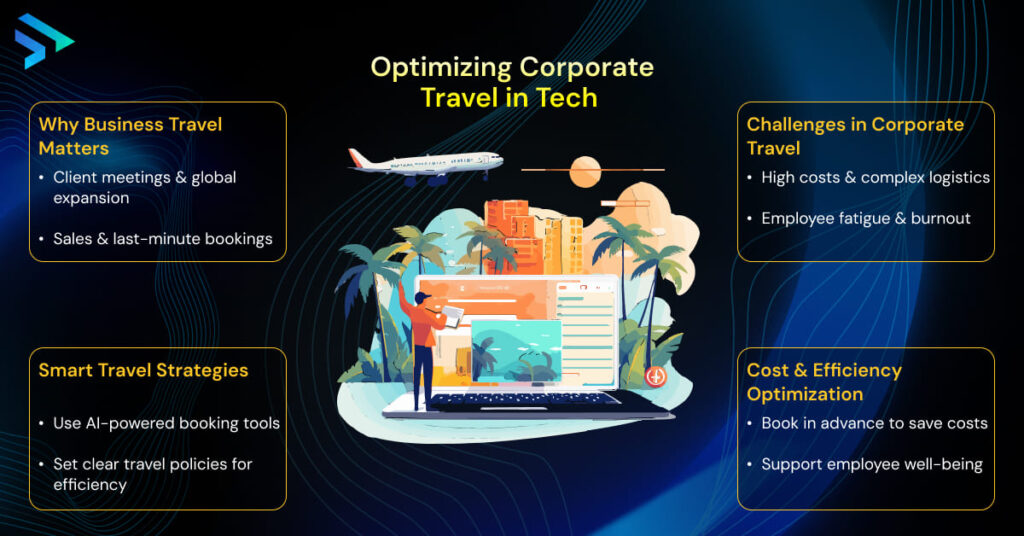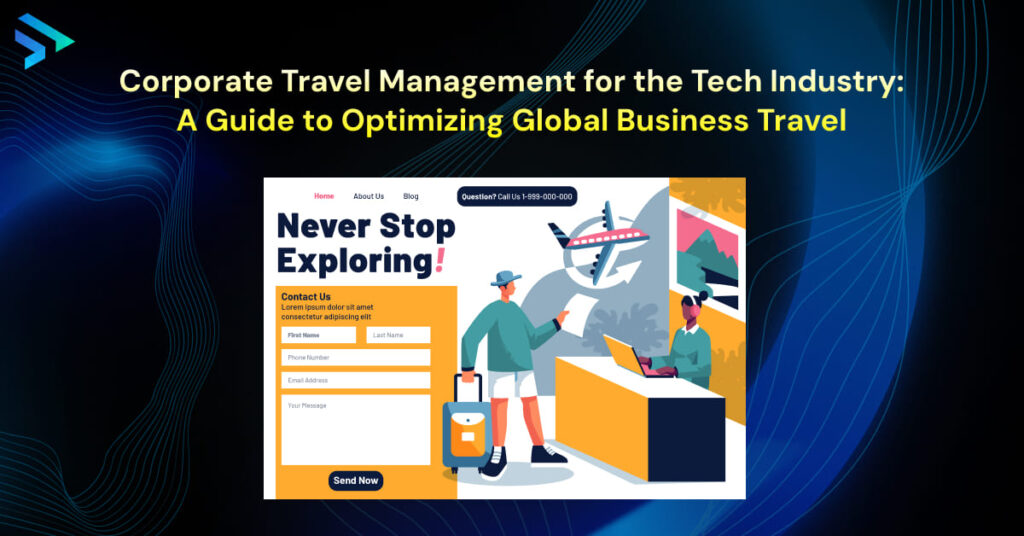In tech, the focus is usually on the next product, the next release, or the next market. But behind all of that innovation is something often overlooked the role business travel plays in making it happen.
From engineers flying out to troubleshoot systems, to sales teams meeting with enterprise clients across time zones, travel remains a key part of how tech companies operate. And with the Global Business Travel Association projecting business travel spend to hit $1.5 trillion by 2025, tech firms are among the top contributors.
But all this movement comes with a cost not just financially, but operationally. Without a clear strategy, travel becomes chaotic: expenses balloon, policies are ignored, and employees burn out.
So how do tech companies stay mobile while staying smart? This guide breaks down practical strategies to help teams manage travel better without slowing down global growth.

Why Travel Still Matters in Tech
For most tech companies, travel isn’t just another line item, it’s a business enabler. Whether it’s software deployment, a global pitch, or a meetup with remote colleagues, in-person interaction still drives a lot of momentum.
1. Project Work That Can’t Be Done Remotely
Plenty of tech work happens online. But some things like system integration or on-site training still require a flight.
- A cloud services team setting up a hybrid environment for a Fortune 500 client
- Engineers flying out to troubleshoot a mission-critical deployment
- Cybersecurity consultants doing hands-on risk assessments
In these moments, presence matters.
2. Conferences & Industry Events
Tech events are more than keynotes and swag bags. They’re launchpads for new ideas, partnerships, and visibility.
- CES remains the top draw for hardware and consumer tech
- Google I/O is a must for dev teams and Android innovators
- AWS reinvent pulls the entire cloud ecosystem together
These gatherings keep teams plugged in and competitive.
3. Sales and Global Business Development
Sales teams in tech aren’t just demonstrating features they’re building trust.
- Meeting potential clients face to face shortens the sales cycle
- On-site pitches help close large enterprise accounts
- Expanding into APAC or EMEA often requires boots on the ground
When millions are on the line, shaking hands still matters.
4. Internal Team Building for Remote-First Companies
Even in distributed setups, culture needs connection. Many tech firms now host annual retreats, leadership off-sites, or all-hands meetups to align remote teams.
It’s not about meetings it’s about momentum.
5. Pitching to Investors & VCs
Startups don’t just pitch over email. When raising funds or forging strategic partnerships, face-to-face meetings increase deal closure rates by up to 34% (Harvard Business Review).
The Real-World Travel Challenges Tech Companies Deal With
When tech companies send people on the road, it’s usually for something important a big deal, a product launch, or a hands-on deployment. But as useful as travel is, it comes with its fair share of issues.
- Costs pile up fast. Especially with short notice.
- People get tired. Jumping between time zones wears them down.
- Policies get ignored. Or worse, they don’t exist.
- Data isn’t always safe. Public Wi-Fi and lost laptops are real risks.
None of this is unusual but it does slow teams down. And when you’re in a fast-moving industry like tech, that kind of drag adds up.
What Smart Travel Management Looks Like in Tech
| Focus Area | Practical Action | Business Impact |
|---|---|---|
| Travel Policy | Clear rules, emergency protocols, and vendor preferences | Lower costs, better compliance |
| Travel Management Tools | Use platforms like TripActions, Concur, or TravelPerk | Less admin, more visibility |
| Booking Practices | Advance booking, corporate cards, loyalty programs | Saves money, improves experience |
| Employee Wellness | Offer recovery time, upgraded seats, lounge access | Boosts morale, reduces burnout |
| Cybersecurity | VPNs, MFA, secure devices | Reduces risk of breaches on the road |
| Analytics & Reporting | Track spend, satisfaction, booking trends | Smarter planning, stronger forecasting |
So how are the more organized teams doing it? They’re not flying less they’re just flying smarter. Here’s what’s working.
Start With a Policy That Actually Makes Sense
A travel policy shouldn’t feel like a block. It should feel like a guide one that answers the question:
How do we travel well, without wasting time or money?
The best policies are simple. They tell you:
- Which airlines or hotels to use
- What’s covered (and what’s not)
- How to get a trip approved without jumping through hoops
- What to do if something goes wrong mid-trip lost bag, illness, or a data breach
The point isn’t control. It’s clarity.
Pick Tools That Work the Way You Do
Manual spreadsheets aren’t going to cut it. Most tech companies doing a decent amount of travel now use tools that handle:
- Booking
- Expense tracking
- Policy enforcement
- Real-time updates
Platforms like TripActions, SAP Concur, and TravelPerk are built for this. They save time, surface better options, and reduce the usual back-and-forth.
Book Smarter, Not Cheaper
You don’t need to cut corners you just need to stop overpaying for the basics.
- Booking flights even two weeks out can save 30% or more
- Using corporate cards helps track spending and often comes with lounge perks
- Working directly with airlines or hotel groups can unlock bulk discounts or upgrade deals
It’s not about micromanaging it’s about giving teams better options, earlier.
Think About People, Not Just Plans
No one does their best work jet-lagged and worn out. If you want your team to be sharp, give them a little room to recover.
That might mean:
- Upgrading to premium economy on long flights
- Letting them skip the office for a day after a major trip
- Giving them access to lounges so they’re not working from a crowded gate
A little flexibility goes a long way.
Travel Means Risk. Plan for It.
Cybersecurity isn’t just a desktop problem. A laptop on public Wi-Fi at a conference is an easy target.
Your team should be using:
- VPNs
- Multi-factor authentication
- Encrypted devices
- Clear reporting processes in case anything’s lost or compromised
If someone’s carrying sensitive info, you need to treat them like a moving endpoint. Because that’s exactly what they are.
Use the Data, Don’t Just Collect It
Most tech companies are already collecting travel data. But what’s often missing? Actually using it to make better decisions.
That doesn’t mean fancy dashboards or weekly reporting it means noticing what keeps happening, and adjusting based on that.
Is one team traveling more than the others? Are most trips being booked last minute? Are people satisfied with the way travel is handled?
These aren’t hard questions. But they’re the ones that help you shape smarter policies. Less guesswork. Fewer surprises. Better outcomes.
Conclusion: If Travel Is a Growth Tool, Treat It Like One
For growing tech companies, business travel isn’t going anywhere. Teams still need to meet. Deals still happen in person. Culture still matters.
But unmanaged travel? That’s expensive financially, operationally, and emotionally.
The fix isn’t to cut travel altogether. It’s to treat it like any other part of your business:
Set expectations. Support your people. Use the tools that make it easier.
Because when travel runs smoothly, your team can focus on what really matters building what’s next.



